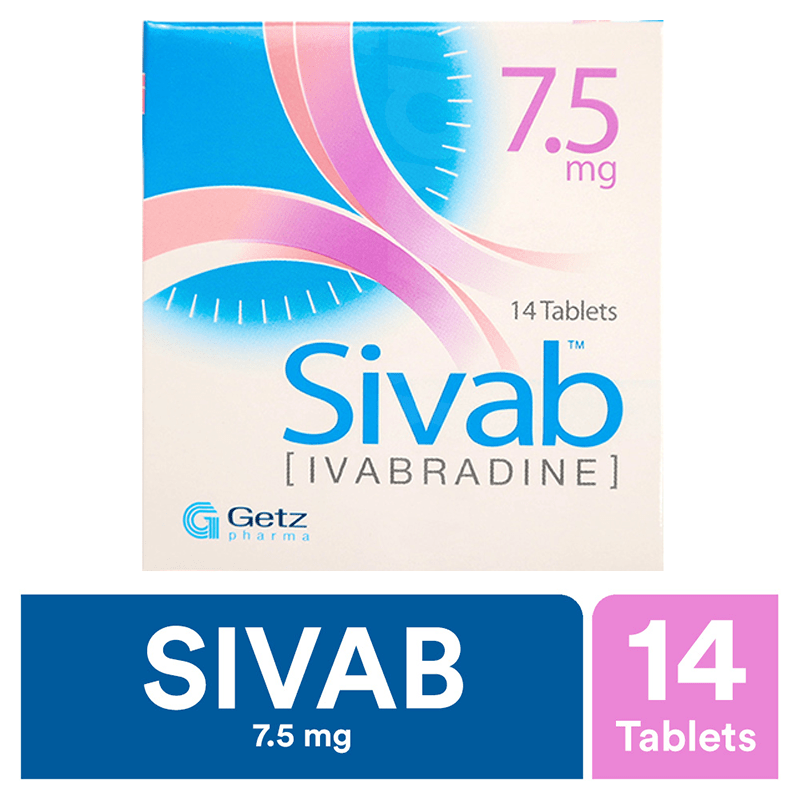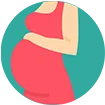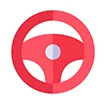
Sivab 7.5 mg tablets 2 x 7's
![]() Prescription Required
Prescription Required

![]() Prescription Required
Prescription Required
This medcine is indicated in chronic stable angina (consistent duration and severity of brief episodes of pain, pressure, squeezing and tightness in chest), coronary artery disease (narrowing or blockage of arteries of heart muscles) with normal sinus rhythm (normal heart rate) who have a contraindication or intolerance to beta blockers when monotherapy is inadequate and heart rate is more than 60 beats per minute. It is also used in patients with stable chronic heart failure, with systolic dysfunction (impairment in contraction of ventricles). In patients with stable chronic heart failure (chronic heart failure in which clinical condition didn’t get any worse) with systolic dysfunction (impairment in contraction of ventricles), in sinus rhythm (pace with which heart beats) rate equals to 75 beats per minute in combination with standard therapy, including beta blockers or when beta blockers are contraindicated, or not tolerated.
Its side effects include blurred vision, bradycardia (slow heart rate), 1st degree AV block (when there is a delay in conduction), ventricular extrasystole (premature contraction of ventricles), blood pressure changes, dizziness, headache etc.

This medicine is contraindicated in pregnancy. Consult your doctor before use.

This medicine is contraindicated in pregnancy. Consult your doctor before use.

Please avoid driving when taking this medicine as it may affect your ability to drive.

Elderly patients and patients with mild to moderate hypotension (low blood pressure), renal (kidney) insufficiency, moderate hepatic (liver) impairment, heart failure and retinitis pigmentosa (genetic disorder that causes loss of vision) may be sensitive to the drug. Patients should be monitored regularly for atrial fibrillation (irregular heart beat), QT syndrome or QT prolongation (a condition in which there is increased risk of irregular heart beat). For intraventricular defect (disturbance in propagation of impulse) and ventricular dyssynchrony (unsynchronized contractions of ventricles) patient should be monitored closely. After any changes in treatment, the patient's blood pressure should be monitored.
It is contraindicated in patients with pretreatment heart rate less than 60 beats per minute, persistent symptoms of bradycardia (very low heart rate) or if heart rate is persistently below 50 beats per minute, cardiogenic shock (a condition in which heart suddenly fails to pump enough blood to meet your body’s requirement), acute myocardial infarction (heart attack), severe hypotension (low blood pressure) (less than 90/50 mm Hg), sick sinus syndrome (a condition in which heart’s natural pacemaker is unable to create appropriate heart rate), sino atrial block (disorder in normal rhythm of heart, that started at SA node), unstable or acute heart failure (heart failure in which clinical condition is worsening), pacemaker dependent, unstable angina (condition in which heart is deprived of sufficient blood flow and oxygen), 2nd (conduction of atrial impulse through AV node is blocked or delayed) or 3rd (abnormal heart rhythm due to defect in conduction system) degree AV block, cardiac arrhythmias (abnormal heart rhythms), severe hepatic (liver) impairment or in patients immediately after stroke.
When should I take Ivabradine?
Take two doses, one with breakfast and the second dose with the evening meal.
What are the side effects of Ivabradine?
Blurred vision, irregular heart beat, chest discomfort, dizziness, tiredness etc are some of its side effects.
What is the purpose of Ivabradine?
It is used to treat adults with heart failure (inability of heart to pump sufficient blood) to lower the risk that the condition will get worse.
Does Ivabradine make you tired?
Dizziness and tiredness may occur.
Can Ivabradine cause breathlessness?
Yes, It may cause breathlessness.
Disclaimer
Dawaai's intention is to make sure that it's consumers get information that is accurate, reviewed by an expert and error-free. However, the information mentioned here should not be used as a replacement for the advice of a qualified physician. The information given here is for informational purposes only, which may not cover all possible precautions, side effects, contraindications or drug interactions. Consult your doctor and discuss your queries related to any medicine or disease.
Offers
Up to 10% OFF
Get discounts of up to 10% on every item added to your cart. Use Voucher: DawaaiDiscount

Up to 20% OFF
Get flat 20% off only on Fridays with Meezan Bank Credit/Debit Card. Use Voucher: MeezanFridays

Up to 20% OFF
Get 15% off all products and 20% off medicines using HBL debit and credit card. Use Voucher: HBLDiscount

Up to 25% OFF
Get up to 25% off medicines when you pay through Habib Metro Cards. Use Voucher: HMBDiscount

Up to 25% OFF
Get 25% off on Visa Signature Credit Card and 15% off on Platinum Cards on medicines only. Use Voucher: SBDiscount
